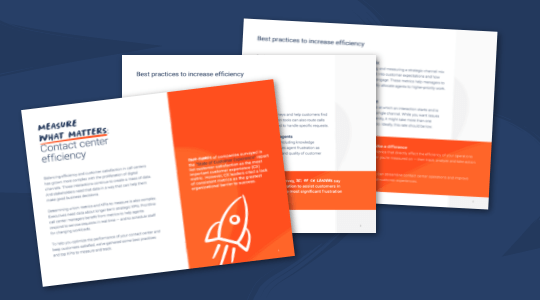Your Genesys Blog Subscription has been confirmed!
Please add genesys@email.genesys.com to your safe sender list to ensure you receive the weekly blog notifications.
Subscribe to our free newsletter and get blog updates in your inbox
Don't Show This Again.

Customer experience is more complex than ever. Companies must delight savvy consumers who communicate across a growing number of digital channels.
Your customers want to be in control — regardless of the channel they’re on at any given moment. They expect easy access to products; accurate answers to their questions; and rapid service when they encounter issues.
And your employees want some control of their own: flexibility in their schedules; freedom in how they work; and access to technology that enables them to succeed.
In an evolving experience economy, we’re at an inflection point. Success in the years ahead will require the seamless orchestration of customer and employee experiences.
As this year progresses, we can expect increasing labor costs to fuel growth in AI and digital automation as leading organizations strive to increase customer and employee satisfaction. This investment will augment their workforces while making work easier for employees in the contact center and beyond.
In this blog, we’ll explore the topic of contact center automation: What it is, some common capabilities and benefits, and challenges of implementing it in the contact center.
Contact center automation uses technology to perform repetitive, manual and time-consuming tasks more efficiently to make life easier for your employees and your customers. It can free up employees from repetitive tasks so they can focus on higher-value work. This not only makes them more productive, it can also improve their satisfaction in work.
Some key areas where automation can improve a contact center include:
Common software systems used in an automated contact center include:
Automatic call distributor: An automatic call distributor (ACD) answers incoming phone calls and intelligently routes each call to a specific employee or department based on the caller’s needs. A smart ACD solution can turn interactions into a seamless experience.
Outbound campaigns: Engage with customers on their terms. With outbound campaigns, you can send highly personalized, timely and relevant notifications on their preferred channels.
Automatic callback: When an employee is unavailable and the customer doesn’t want to wait, this computer telephony calling feature allows the customer to instruct the system to return their call when an employee becomes available, or choose a time that works best for them. Callbacks can reduce customer effort, maximize employee productivity and reduce operational costs.

Every customer interaction generates data you can use to improve efficiency. Here are some tips for choosing the right KPIs.
Deploying automation capabilities in your contact center allow you to deliver better outcomes with less effort. Smart automation can help you improve customer and employee experiences. And it can help you anticipate what your customers want.
Here are some of the main capabilities of modern contact center automation:
Digital customer engagement: Enable customers to strike up conversations on digital channels including email, web chat and SMS messaging. Improve engagement with chatbots that can automate routine tasks such as delivering important information based on the customer’s intent, scheduling appointments, carry out simple transactions and more.
Speech-enabled IVR: Equip customers to resolve issues faster with multilingual, speech-enabled IVR. Natural language understanding technology enables your customers to interact with your system in a way that feels natural. And self-service capabilities can transfer the full context to an employee if the customer needs a human interactions to resolve their issue. This creates a seamless end-to-end experience for customers.
Knowledge management: Automatically deliver the right information across channels with AI that ensures knowledge is surfaced according to the customer’s intent. Monitor how your customers and employees use knowledge and update it easily.
Predictive routing: Improve your processes with AI-powered routing that matches customers to the right employee, on the right channel, at the right moment. AI predicts the employee best suited to resolve the customer’s issue the fastest, or meet any other performance KPI that you choose.
Voicebots: Make the virtual more personal with intelligent voice assistants that are available 24/7. Voicebots leverage machine learning and natural language processing to automate real-time conversations that feel natural and intuitive — like you’re interacting with a human being. And, when needed, the bots can pass customers — with full interaction context — to employees for seamless experiences.
Predictive engagement: Engage customers at just the right moment with the right information or product recommendation. Provide seamless customer experiences with employees and bots empowered by real-time, historical, predictive and third-party customer data.
Agent assist: Make it easy for your voice and digital employees to do their job with an assisted solution that surfaces relevant knowledge in real time — eliminating frustrating, time-consuming searches for specific information. Free employees from the drudgery of manual work with robotic process automation that handles repetitive tasks like copy/paste and note taking.
Automation can enable organizations to deliver end-to-end customer and employee experiences effectively, efficiently and profitably. Here are just some of the benefits of contact center automation:
Increased customer satisfaction: Empower people to easily find their own answers, get 24/7 customer service from bots and reach a human representative when they need to.
Increased employee satisfaction: Enhance job satisfaction and retain more employees by reducing repetitive manual work and allowing employees to focus on what they do best. Employees want to be challenged; in fact, learning new skills and technologies is what they enjoy most about their job, according to our Human Values Report.
Higher first-contact resolution: Handle more customer issues correctly the first time. Route routine inquiries to bots while allowing employees to focus on the more complex and rewarding customer interactions.
Fewer errors: Reduce your errors with automation capabilities, such as real-time AI assistance to your employees and an intuitive knowledge base that automatically delivers the right information to customers and employees alike.
Lower operational costs: Streamline your operations and keep customers from waiting on hold with capabilities like automated callbacks and bots that answer across channels 24/7.
While automation can help you improve your contact center in many ways, there are some potential challenges.
Loss of human interaction: Some people still prefer to converse with a human and will seek to bypass an IVR or a bot.
Humans still needed: Bots can mainly handle two main types of tasks: transactions and knowledge queries. However, one-off requests or complex issue resolution may still require human intervention.
Bad bots make matters worse: Bot usage has increased, but research shows satisfaction with those interactions has decreased in recent years. Consumers can quickly grow frustrated with bots that don’t understand their questions or cause them to get stuck in a dead end. And this can hurt customer sentiment of your company.
While contact center automation offers many benefits, it’s critical to use these technologies in the right way — to provide speed, accuracy and flexibility without derailing the customer experience.
Some companies incorporate AI and automation capabilities without being strategic. It’s critical to consider how bots fit into the journeys your customers take — and how they support a customer experience that’s orchestrated from beginning to end. It’s also useful to begin with simple use cases, and use those learnings over time to layer on automation that handles more complex use cases.
Regardless of your industry, your customers want to be heard, seen and understood; they expect service that’s infused with empathy. Many of them prefer to find information and troubleshoot issues on their own — and get fast assistance when they’re unable to. And your employees crave tools that help make their jobs more fulfilling and less stressful.
Discover how intelligent automation can help you meet these growing expectations and personalize experiences at scale.
Subscribe to our free newsletter and get blog updates in your inbox.